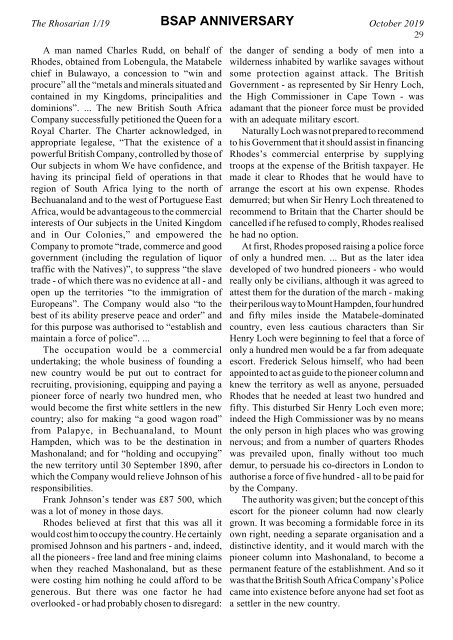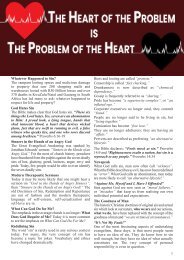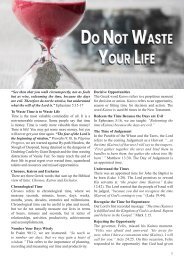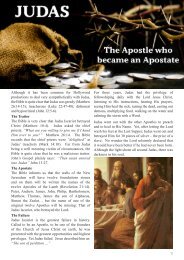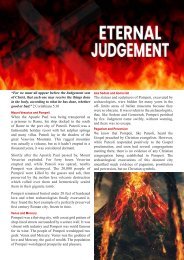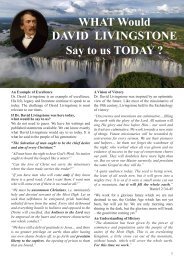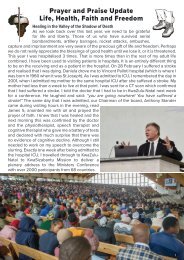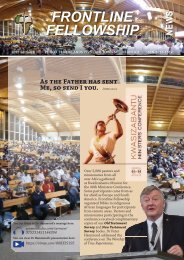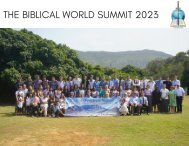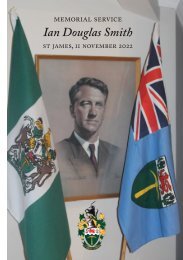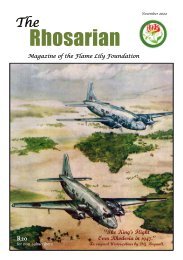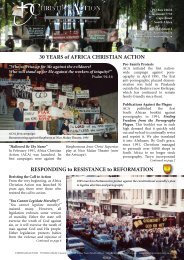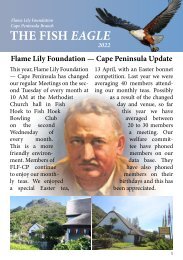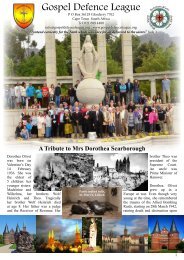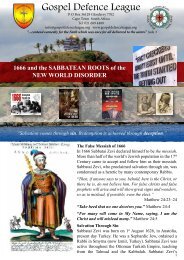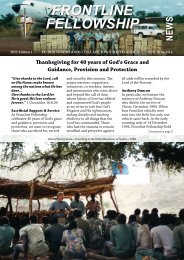Rhosarian 2019
You also want an ePaper? Increase the reach of your titles
YUMPU automatically turns print PDFs into web optimized ePapers that Google loves.
The <strong>Rhosarian</strong> 1/19<br />
28<br />
Over the Anniversary Weekend of 20-22<br />
September <strong>2019</strong>, the Transvaal Branch of the<br />
BSA Police Regimental Association entertained<br />
former members from far and wide with a fantastic<br />
reunion, celebrating the 130 th anniversary of the<br />
formation of the BSAP.<br />
Brainchild of Rob<br />
Bristow, the main<br />
event was a memorial<br />
service in the Garden<br />
of Remembrance at the<br />
Dickie Fritz MOTH<br />
complex on Saturday<br />
21 September. The<br />
service was preceded<br />
by a march-on of BSAP<br />
veterans, led by a<br />
Scottish pipe band. The<br />
unveiling and dedication of a life-size bronze<br />
statue of a policeman in the reverse arms salute<br />
position followed the sermon delivered by a former<br />
policeman, Bishop David Bannerman (7705).<br />
The Roll of Honour was read by John Sutton.<br />
Dave Holmes gave the<br />
address, explaining the<br />
historical significance<br />
of this occasion. The<br />
service ended with the<br />
“Last Post” and<br />
“Reveille”, with the<br />
laying of wreaths,<br />
rendition of ‘Rise O<br />
Voices of Rhodesia’ by<br />
Steve and Dana<br />
Prophet, and reading of<br />
“I was there” by John Sutton.<br />
The MOTH ladies at Dickie Fritz prepared a<br />
light lunch alongside The Ridgeback pub, while<br />
balladeer John Edmond carried the reunion into<br />
the afternoon with his entertainment.<br />
A formal luncheon took place on Sunday 22<br />
September, presented in the usual efficient way<br />
that we have come to expect from the BSA Police<br />
Regimental Association. Old friendships were reestablished,<br />
including some from as far afield as<br />
the USA, Australia, New Zealand, Zimbabwe and<br />
the UK.<br />
Congratulations to all those who had a part in<br />
organisaing and conducting the event.<br />
BSAP ANNIVERSARY<br />
October <strong>2019</strong><br />
The following extract comes from ‘The History<br />
of the BSAP’ by Peter Gibbs, for the benefit of<br />
those not familiar with how the BSAP came into<br />
being 130 years ago, or have simply forgotten.<br />
It is a little unusual for the police force of a<br />
country to be created before that country actually<br />
exists. But although Cecil Rhodes’s pioneers only<br />
entered the territory that lies between the Limpopo<br />
and Zambezi rivers in July 1890 - and only formally<br />
occupied Mashonaland by raising the Union Jack<br />
at Fort Salisbury in September - the first troops of<br />
what were to become the British South Africa<br />
Company’s Police had been established and<br />
recruiting had been started, outside the country, as<br />
early as November the previous year.<br />
Before long the force was to play a formidable<br />
part in what has been called “the scramble for<br />
Africa”.<br />
The history of southern Africa, after the advent<br />
of the white man in 1652, has been written many<br />
times and has been given as many interpretations.<br />
Especially where the British are concerned, the<br />
interpretations range from the heroic to the<br />
iconoclastic - from a blind reverence for honourable<br />
intentions to accusations of undiluted perfidy.<br />
The idea of obtaining a Royal Charter for his<br />
newly proposed company, the British South Africa<br />
Company, to occupy, and operate in, the new<br />
territory, has often been credited to Rhodes. The<br />
belief that it was Rhodes’s original notion has<br />
more recently been challenged. But whether or not<br />
it was his own idea, it appealed to him immensely.<br />
If his new company (which would, of course, be<br />
controlled principally by his own de Beers) were<br />
to be granted a Charter by Queen Victoria he could<br />
have the best of both worlds:<br />
the venture would be “colonial” in that in<br />
practice it would be undertaken and controlled by<br />
the people on the spot; it would be “imperial” only<br />
so far as it would receive from the British<br />
Government political backing and, if the worst<br />
happened, military protection. But before<br />
petitioning the Crown for a Charter it would<br />
clearly be necessary to obtain from the people at<br />
present in the territory at least some semblance of<br />
the right to operate there - some claim to preference<br />
over anybody else who might be after the same<br />
thing.


